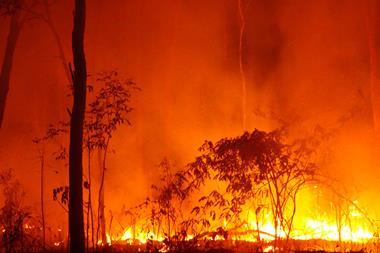Research from FM Global shines a light on the vulnerability of commercial properties which lack resilience
Climate-related losses at commercial properties with the highest climate risk are 30 times more likely to occur and be 180 times more severe than at properties with the lowest climate resilience, according to FM Global research.
The insurer has launched two products to help clients to better assess their vulnerability to physical-related climate risks and to meet new ESG reporting requirements.
“We’ve analysed losses from climate risk and the value of climate resilience,” said Randall Hodge, executive vice president, staff insurance operations, at FM Global.
“These new climate resilience products provide our clients with informed guidance from which they can prioritise their climate-risk-mitigation investments, ultimately leading to a more resilient tomorrow.”
Risk prioritisation
The Climate Risk Report scores each client organisation based on the actions they have taken to address climate risk and their unique exposure to events like flood, windstorms, hail and wildfire.
A client’s score is based on both actionable risks—those that can be mitigated by actions like installing flood barriers—and inherent risks, such as exposure to extreme weather.
This information helps CEOs, CFOs, chief sustainability officers, risk managers and other business leaders prioritise their most critical investments in climate resilience.
The Climate Risk Report is based on billions of property-risk data points FM Global has collected in more than 60,000 engineering visits each year to client sites.
The report is also underpinned by artificial intelligence, machine learning and predictive analytics to help clients prioritise their risk improvement efforts.
Investments in resilience have a strong potential to help organisations reduce total loss expectancies from climate-related exposures.
Help with ESG reporting
Meanwhile, the insurer’s Climate Reporting Aid, is a guide that helps clients disclose acute and chronic climate-related financial risks to investors and the public, according to widely-adopted frameworks like the international Task Force on Climate-related Financial Disclosures (TCFD), consisting of representatives from across the G20.
“We are learning from our clients, and in particular from their chief sustainability officers, that this data is very valuable in completing these financial disclosures, and that data can be difficult and costly to obtain otherwise,” said Hodge.
Climate risk disclosure is an integral component of reporting on environmental, social and governance (ESG) factors, a pressing responsibility for global organisations.
Data from a custom Climate Risk Report can support reporting on climate-related opportunities and planned actions toward greater climate resilience.
The Climate Risk Report and Climate Reporting Aid also will be provided to policyholders of AFM, FM Global’s middle-market business unit.
Find out all about our upcoming Climate Change & ESG Forum, in partnership with the Institute of Risk Management
World@RISK: ESG & climate Change Forum 2022 - new speakers announced for 15 November
- 1
- 2
- 3
- 4
- 5
- 6
- 7
- 8
 Currently reading
Currently readingExtreme climate losses 30x more likely at exposed premises
- 9
- 10
- 11
- 12
- 13
- 14
- 15
- 16
- 17
- 18





































No comments yet